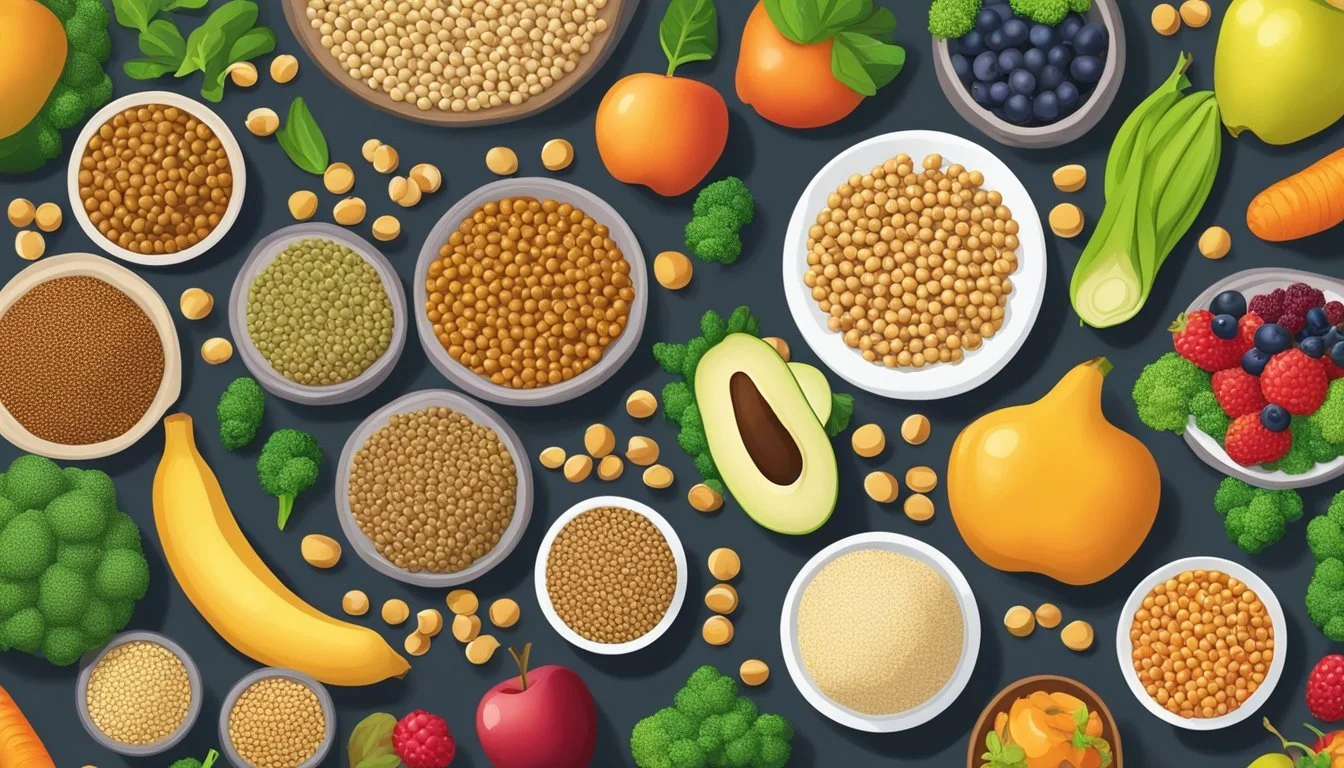8 Estrogen-Rich Foods
Top Sources to Boost Hormonal Balance
Estrogen is a vital hormone that plays a crucial role in various bodily functions, particularly in regulating the reproductive system. Foods high in estrogen, specifically phytoestrogens, can offer potential health benefits by mimicking or enhancing the effects of natural estrogen in the body.
Incorporating these estrogen-rich foods into your diet may help maintain hormonal balance and support overall health. Phytoestrogens are found in various plant-based foods and can contribute to a well-rounded and nutritious dietary plan. Understanding the sources and potential benefits of these foods can be beneficial for individuals looking to support healthy hormone levels through their diet.
1) Flaxseed
Flaxseed is one of the richest dietary sources of phytoestrogens, particularly lignans. These compounds mimic estrogen in the body, making flaxseeds a significant contributor to dietary estrogen intake.
Flaxseeds also contain omega-3 fatty acids and fiber, contributing to their health benefits. Including flaxseeds in a diet may help manage symptoms related to menopause due to their estrogen-like effects.
Research indicates that flaxseeds may have potential anti-cancer properties. They have been studied for their ability to inhibit the growth of estrogen-dependent breast cancer cells. The anti-inflammatory properties of flaxseeds further add to their health-promoting effects.
These seeds are versatile and can be easily added to various dishes, including smoothies, salads, and baked goods. They are available in different forms such as whole seeds, ground meal, and oil. Ground flaxseeds are often preferred for better nutrient absorption.
2) Soybeans
Soybeans are a significant source of phytoestrogens, specifically isoflavones. These compounds can mimic estrogen in the body and may help balance hormone levels. Soy-based foods like tofu, tempeh, and edamame are common in many diets and provide these beneficial isoflavones.
In addition to their hormonal benefits, soybeans are rich in protein and essential nutrients. They offer a versatile ingredient for many dishes, from salads to main courses. Incorporating soybeans into meals can help increase dietary fiber and promote overall health.
While soybeans themselves are beneficial, some soy-based products, such as soy sauce and soybean oil, do not provide the same level of isoflavones. They are often high in sodium and may contain unhealthy fats. Choosing whole or minimally processed soy products ensures the best health benefits.
3) Tofu
Tofu, also known as bean curd, is a popular plant-based protein derived from soy milk. It is created by curdling fresh soy milk and pressing it into solid blocks, similar to how cheese is made from milk.
Soy foods like tofu contain isoflavones, a type of phytoestrogen that mimics estrogen in the body. These compounds are believed to help manage some symptoms of menopause and support bone health.
Tofu is a versatile food item that can be grilled, sautéed, or added to soups and salads. Its ability to absorb flavors from other ingredients makes it a favorite in many cuisines around the world.
Aside from its estrogen-like properties, tofu is also rich in essential nutrients. It provides a significant amount of protein, iron, and calcium, making it a healthy choice for vegetarians and vegans.
4) Tempeh
Tempeh is a soy-based product known for its high concentration of phytoestrogens, specifically isoflavones. These plant hormones mimic estrogen in the body, potentially beneficial for those looking to balance their hormone levels.
Tempeh is made by fermenting soybeans, which enhances its nutritional value and makes it easier to digest compared to other soy products.
In addition to its estrogen-like properties, tempeh is a rich source of protein, fiber, vitamins, and minerals. It also contains probiotics from the fermentation process, which can support gut health.
Tempeh is versatile in cooking. It can be grilled, sautéed, or crumbled into dishes, making it a popular choice for vegetarians and vegans looking to boost their estrogen intake.
Given its combined benefits of nutrients and phytoestrogens, tempeh can be a valuable addition to a diverse, balanced diet.
5) Sesame Seeds
Sesame seeds are small, nutrient-dense powerhouses rich in phytoestrogens. Phytoestrogens are plant compounds that mimic estrogen in the body, helping to maintain hormonal balance. Among seeds, sesame seeds are particularly notable for their high phytoestrogen content.
In addition to their estrogen-mimicking properties, sesame seeds are packed with essential nutrients. They are an excellent source of healthy fats, dietary fiber, and protein. They also offer a variety of vitamins and minerals, including calcium, magnesium, iron, and zinc.
Consuming sesame seeds can be incorporated into a variety of diets. They can be sprinkled on salads, blended into smoothies, or added to baked goods. Tahini, a paste made from ground sesame seeds, is commonly used in cooking and is an easy way to enjoy the benefits of sesame seeds.
Research suggests that including sesame seeds in the diet may support cardiovascular health and bone strength. They have also been found to potentially support skin and hair health due to their nutrient content.
For individuals looking to boost their estrogen levels naturally, sesame seeds are a practical and versatile option. Incorporating them into daily meals can be both simple and beneficial.
6) Hummus
Hummus is a popular Middle Eastern dip made primarily from chickpeas.
Chickpeas are known for being a good source of phytoestrogens. Phytoestrogens are plant-derived compounds that mimic the function of estrogen in the body.
Hummus also contains ingredients like tahini, lemon juice, and garlic, adding to its nutritional value. It is not only rich in phytoestrogens but also provides protein, fiber, and healthy fats.
Including hummus in the diet can be a delicious way to support balanced estrogen levels. It can be enjoyed with vegetables, bread, or as a part of various dishes.
For those looking to boost their estrogen intake through natural foods, hummus is a practical and tasty option. The high fiber content in hummus can also support digestion and overall gut health.
The versatile nature of hummus makes it easy to incorporate into different meals and snacks. Regular consumption can be beneficial for maintaining health, especially for women experiencing menopause.
7) Garlic
Garlic is not only a popular culinary ingredient but also a significant source of phytoestrogens.
It contains high levels of isoflavones, which are compounds that may offer various health benefits related to estrogen.
Isoflavones in garlic can help in reducing cholesterol levels, lowering blood pressure, and preventing blood clots.
These properties may provide protection against heart disease.
Garlic has been studied for its potential in protecting against bone loss due to estrogen deficiency.
Incorporating garlic into daily meals is an easy way to benefit from its properties.
Garlic's versatility in cooking makes it a practical option for improving overall health.
Adding garlic to soups, stews, and sauces can enhance flavor while providing phytoestrogens.
Its health benefits extend beyond estrogen-related effects, making it a valuable addition to a balanced diet.
8) Dried Apricots
Dried apricots stand out as one of the fruits with the highest levels of phytoestrogens. These plant-based estrogens can mimic estrogen in the body, potentially helping to balance hormone levels.
Rich in vitamins and minerals, dried apricots offer a nutritious snack option. They are particularly high in vitamin A, which supports vision and immune function.
Consuming dried apricots can be a convenient way to increase phytoestrogen intake. They are easily incorporated into various dishes, from salads to desserts.
In addition to phytoestrogens, dried apricots provide dietary fiber. This can aid digestion and promote gut health.
While they are an excellent source of nutrients, it's important to consume dried apricots in moderation due to their high natural sugar content.
9) Peaches
Peaches are a natural source of phytoestrogens, plant compounds that mimic estrogen in the body.
Consuming peaches may be beneficial for those looking to balance their estrogen levels.
Phytoestrogens found in peaches can potentially help alleviate some menopausal symptoms.
Peaches are also rich in vitamins, minerals, and antioxidants.
These nutrients support overall health and can contribute to maintaining a balanced diet.
Peaches can be enjoyed fresh, dried, or as part of various recipes.
Including peaches in your diet can offer a delicious and nutritious way to boost phytoestrogen intake naturally.
10) Alfalfa Sprouts
Alfalfa sprouts offer a notable source of phytoestrogens, specifically isoflavones and coumestrol. These compounds can mimic the action of estrogen in the body. This characteristic makes alfalfa sprouts a valuable addition to a diet aimed at increasing estrogen intake.
In addition to their phytoestrogen content, alfalfa sprouts are low in calories and rich in nutrients. They provide essential vitamins and minerals such as vitamin K, vitamin C, and manganese. The sprouts are also known for their high soluble fiber content, which can aid in cholesterol management.
Despite their small size, alfalfa sprouts pack a nutritional punch. They contain a respectable amount of protein and a variety of bioactive plant compounds. Integrating alfalfa sprouts into salads, sandwiches, and smoothies can be an easy way to boost nutrient intake while seeking estrogenic benefits.
Understanding Estrogen
Estrogen is a vital hormone that affects many aspects of health, particularly in women. It plays crucial roles in reproductive health, bone density, and cardiovascular function, among other things.
The Role of Estrogen in the Body
Estrogen is primarily produced by the ovaries, with smaller amounts coming from the adrenal glands and fat tissues. This hormone is significant for the development of secondary sexual characteristics, such as breast development and the regulation of the menstrual cycle.
In addition to its reproductive functions, estrogen helps maintain bone density. It reduces bone resorption, which is the process where bone is broken down, and calcium is released into the blood. Estrogen also supports the cardiovascular system by promoting healthy blood vessels and influencing cholesterol levels.
Hormonal Balance and Health
Maintaining proper estrogen levels is crucial for overall health. Both low and high levels of estrogen can lead to different health issues. Low estrogen can cause symptoms like hot flashes, night sweats, and mood swings, often experienced during menopause. On the other hand, high estrogen levels may be associated with conditions like endometriosis or certain types of breast cancer.
Various factors can influence estrogen levels, including age, diet, and lifestyle. To support hormonal balance, it is important to consume a balanced diet that includes foods high in phytoestrogens, such as soy products, seeds, and nuts. These foods can mimic the effects of estrogen and help to regulate its levels naturally.
Finally, if there are concerns about estrogen imbalances, it is advisable to seek medical consultation. This can help in diagnosing and managing conditions related to estrogen levels effectively.
Estrogen and Diet
Estrogen is a key hormone that plays a critical role in many bodily functions, and diet can significantly influence its levels. Foods high in phytoestrogens, such as certain nuts, seeds, legumes, and grains, can mimic or support the body's estrogen.
Phytoestrogens: What Are They?
Phytoestrogens are plant-derived compounds that can exhibit estrogen-like activity in the body. They are found in a variety of foods, including soy products, nuts, seeds, and whole grains. Notable phytoestrogens include isoflavones, lignans, and coumestans.
Isoflavones are abundant in soybeans and soy products such as tofu and tempeh. Lignans are found in flaxseeds, sesame seeds, and whole grains. Coumestans, although less common, can be found in foods like split peas and other legumes.
How Food Impacts Estrogen Levels
Diet can significantly impact estrogen levels through the intake of phytoestrogen-rich foods. Soy products, including tofu and soy milk, are well-known for their high isoflavone content, which can mimic estrogen.
Nuts such as cashews, almonds, and pistachios are excellent sources of phytoestrogens. Whole grains like barley, oats, and rye contain lignans that can also boost estrogen levels. Including these foods in one's diet can help maintain hormonal balance.
Regular consumption of phytoestrogen-rich foods may offer protective benefits, such as reducing the risk of certain cancers and supporting bone health. Monitoring and adjusting dietary intake can be a natural approach to managing estrogen levels.




